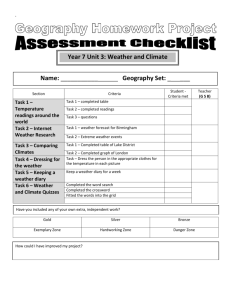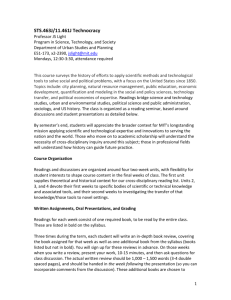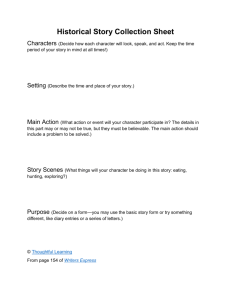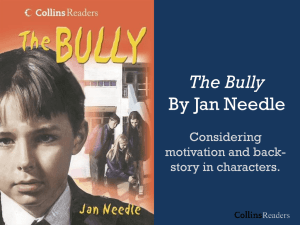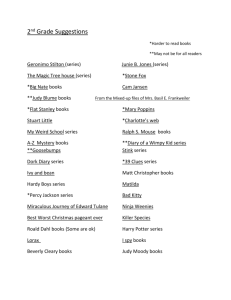New Media: Technology & Society 63-007-18
advertisement
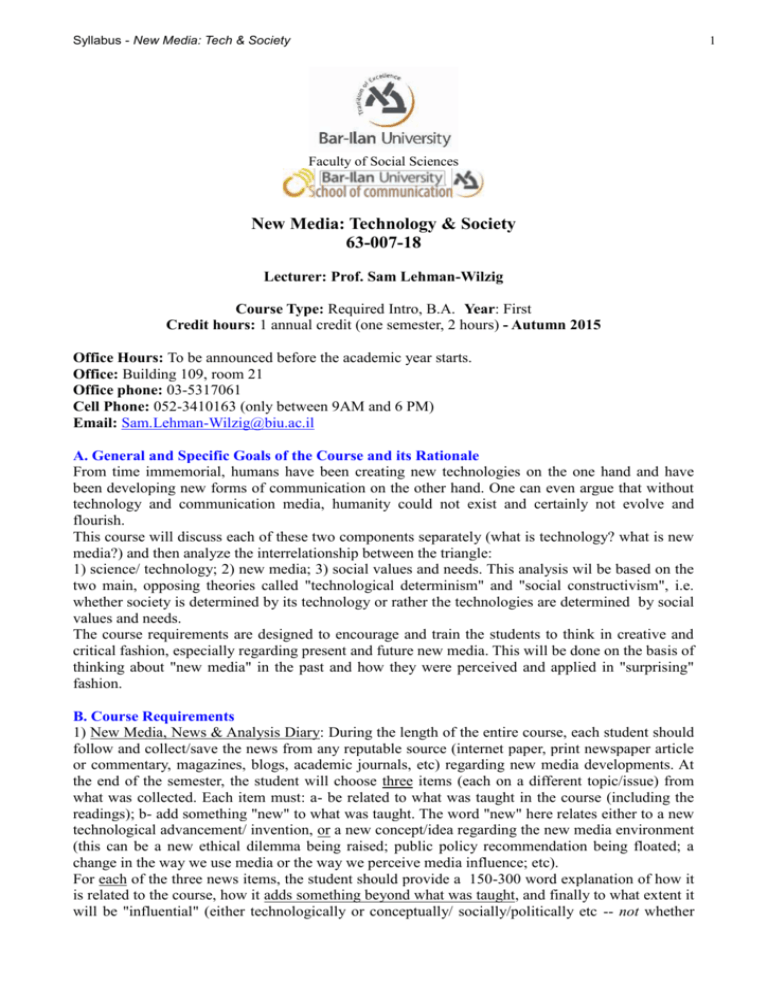
Syllabus - New Media: Tech & Society 1 Faculty of Social Sciences New Media: Technology & Society 63-007-18 Lecturer: Prof. Sam Lehman-Wilzig Course Type: Required Intro, B.A. Year: First Credit hours: 1 annual credit (one semester, 2 hours) - Autumn 2015 Office Hours: To be announced before the academic year starts. Office: Building 109, room 21 Office phone: 03-5317061 Cell Phone: 052-3410163 (only between 9AM and 6 PM) Email: Sam.Lehman-Wilzig@biu.ac.il A. General and Specific Goals of the Course and its Rationale From time immemorial, humans have been creating new technologies on the one hand and have been developing new forms of communication on the other hand. One can even argue that without technology and communication media, humanity could not exist and certainly not evolve and flourish. This course will discuss each of these two components separately (what is technology? what is new media?) and then analyze the interrelationship between the triangle: 1) science/ technology; 2) new media; 3) social values and needs. This analysis wil be based on the two main, opposing theories called "technological determinism" and "social constructivism", i.e. whether society is determined by its technology or rather the technologies are determined by social values and needs. The course requirements are designed to encourage and train the students to think in creative and critical fashion, especially regarding present and future new media. This will be done on the basis of thinking about "new media" in the past and how they were perceived and applied in "surprising" fashion. B. Course Requirements 1) New Media, News & Analysis Diary: During the length of the entire course, each student should follow and collect/save the news from any reputable source (internet paper, print newspaper article or commentary, magazines, blogs, academic journals, etc) regarding new media developments. At the end of the semester, the student will choose three items (each on a different topic/issue) from what was collected. Each item must: a- be related to what was taught in the course (including the readings); b- add something "new" to what was taught. The word "new" here relates either to a new technological advancement/ invention, or a new concept/idea regarding the new media environment (this can be a new ethical dilemma being raised; public policy recommendation being floated; a change in the way we use media or the way we perceive media influence; etc). For each of the three news items, the student should provide a 150-300 word explanation of how it is related to the course, how it adds something beyond what was taught, and finally to what extent it will be "influential" (either technologically or conceptually/ socially/politically etc -- not whether Syllabus - New Media: Tech & Society the inventor/company will make money from it). You may (it is not required) also offer your opinion as to whether this development or idea will "work" (this is not relevant to everything you might choose). Send your "diary" to the lecturer as an email attachment (address is listed above) -- NO PRINT version required or requested -- as ONE DOCUMENT. Preferably as a "doc" (or "rtf") and not "docx" -- and definitely NOT as a PDF! The diary must include the link to each "news/commentary" item or a scanned version of the item, and it must clearly show the publication date (only from the first day of this course onwards: Oct. 1, 2015!). Due date for the diary: Feb. 28, 2016 -- the first day of the second semester. The diary grade will be 33% for the "novelty" of each item (how much it is actually something "new" beyond what was learned; this also includes whether you are the only student to choose it [good!], or it was chosen by several others [that's less successful]) -- and the other 67% of the grade will be based on your analysis of its relationship to the course, the world of new media in general, and its societal influence(s). 2) Exam: This will be an OPEN-BOOK exam, i.e. you can bring any written or printed material that you wish to the exam. That means that the exam question(s) will not test for "memory" of dates, names etc but rather will demand thought, analysis and integration of the materials. The exam includes the lecture material and all the readings from the syllabus (unless where noted "optional"). C. Final Grade Apportionment Attendance and Class Participation: 15% (maximum allowed absences: two) Points will be deducted from the final grade for every absence above that. 6 absences from class = failed grade. News Diary Assignment: 25% Exam: 60% D. Course Program and Accompanying Syllabi Explanation Regarding the Lectures: The classes will include a PowerPoint presentation and student discussions of concepts or challenging questions the lecturer will raise. The PPT slides will be on the course site, so that students can print them (or view them on their laptop) to be able to see them while the class is in session -- thereby avoiding wasting time on too much "scribbling notes" in class. However, in no way does the PPT include the substance of the lectures; it is more in the way of a "main points road map" with accompanying graphics as illustrated examples. Lecture Topics and Accompanying Bibliography: All the items marked by an asterisk/star (*) can be accessed from the course site or through a link on the site. Some of these readings/videos/podcasts are relevant to other course topics as well, and not just the topic under which they are listed. All the "readings" below are required (except where noted). On the other hand, occasionally the lecturer will mention, report, and even upload very new, short items from the internet as additional reading, in which case it will be noted whether it's required or merely recommended. You will see these on the site's bulletin board and also on the topics/readings page. Such readings also can serve as examples of what is expected in the end-of-course "News Diary" assignment. The amount of items on the list below might seem "long", but most are short newspaper items or lectures. And again, you are not expected to memorize the "fine details" but rather understand the main points and broad principles. Section 1: Intro - New Media in the Information Age (1 class session) Main topics: What are the characteristics of the Information Age? What is the importance of new media in such an era? In addition, the session will also go over administrative aspects of the course. 2 Syllabus - New Media: Tech & Society * Hassan, R. (2008). The Information Society. Cambridge: Polity Press, 1-17; 21-31. * Darnton, R. (April 17, 2011). 5 Myths About the 'Information Age', The Chronicle of Higher Education: http://chronicle.com/article/5-Myths-About-the Information/127105 Section 2: Concepts and Issues in Science and Technology (3 sessions) Main topics: What is "science"? What is "technology"? How do they differ and what is their connection? How does the scientific process work and advance? * Kuhn, T. S. (1962). The Structure of Scientific Revolutions. Chicago: Chicago University Press. A Synopsis from the original by Professor Frank Pajares: http://www.des.emory.edu/mfp/kuhnsyn.html Note: This is the most cited book of the 20th century in all the Social Sciences, and undoubtedly one of the most important and influential books in the history of research in general because it deals with the scientific research process in historical perspective. We will relate to parts of this book throughout the course. This synopsis surveys the book's main themes and ideas. It is recommended (but not required) to read the full book in the original. * Kelly, K. (2010). What Technology Wants. New York: Penguin, 6-17. * Wajcman, J. (2002). "Addressing Technological Change: The Challenge to Social Theory," Current Sociology, 50(3), 347-356 (required); 356-360 (optional: these last pages deal with the connection of technology and gender). * Nye, D.E. (2006). Technology Matters: Questions to Live With. Cambridge, MA: MIT Press, 1-15 (chapter 1); 17-31 (chapter 2). Section 3: Concepts and Issues - "New"; "Media"; "Media Ecology" (2 sessions) Main topics: What is a "medium"? When and how do we define it as "new" -- and what are the problems & criteria for doing so? What is "media ecology", i.e. the environmental factors influencing new media's development? * Logan, R.K. (2006). The Biological Foundation of Media Ecology, 1-17 (top of page): http://www.physics.utoronto.ca/people/homepages/logan/BioMedEcol.pdf * Shifman, L. & Blondheim, M. (2008). "From the Spider to the Web: Innis' Ecological Approach to the Evolution of Communication Technologies," in The Toronto School of Communication Theory: Interpretations, Extensions, Applications, eds. R. Watson & M. Blondheim. Jerusalem: The Hebrew University Magnes Press and Toronto University Press, 337-356. Section 4: The Connection Between Technology, Values, Ethics and Social Needs (4 sessions) Main Topics: What is the connection between technology and social values? To what extent do social needs influence technological development? Presenting a cyclical model of the interrelationship between social needs, values, technological development and adoption of technologies by society. * Kelly, K. (2010). What Technology Wants. New York: Penguin, 347-359. Postman, N. (1992). Technopoly: The Surrender of Culture to Technology. New York: Knopf, 21-55 (chapters 2 & 3). 303.483 POS t (305129) 3 Syllabus - New Media: Tech & Society * Sotala, K. (2013). A brief history of ethically concerned scientists (Feb 9): http://lesswrong.com/lw/gln/a_brief_history_of_ethically_concerned_scientists/ The following two articles (Kass and Heyd) should be read together, as the second responds to the first and they deal with the same general issue. * Kass, L. (2007). "Keeping Life Human: Science, Religion, and the Soul" (Wriston Lecture, Oct. 18, 2007), Manhattan Institute for Policy Research: http://www.manhattaninstitute.org/html/wl2007.htm Heyd, D. (Autumn 2008). "Man as his Own Maker," Azure 38. Note: The BIU library e-access only provides a "Preview" of this article. You have to read the complete article in its print version found in BIU's library. * Nova (2011). "The Dangers of Nanotechnology": http://www.pbs.org/wgbh/nova/tech/maynardnanotech-au.html Note: This is a 9 minute podcast; it will take about a minute to download on your computer. * Sam Harris (2010). "Science can answer moral questions," TED Lectures: http://www.ted.com/talks/sam_harris_science_can_show_what_s_right.html Note: This is a 23 minute video of a lecture on the topic. Section 5: The Connection Between New Media, Values, Ethics and Social Needs (3 sessions) Main topics: How have new media influenced society's development through history and in the contemporary period? On the other hand, how have values (beliefs, concepts, ideologies etc.) influenced the development and adoption of new media? What does the future hold, given changing, present-day, new media trends and the transformation of value systems? Finally, how might new media change the academic study of communications, i.e. what sort of revision might "classical" communication theories and methodologies undergo? * n.a. (Dec. 17, 2011). "How Luther went viral: Five centuries before Facebook and the Arab spring, social media helped bring about the Reformation," The Economist: http://www.economist.com/node/21541719 * Lauer, J. (2011). "Surveillance history and the history of new media: An evidential paradigm," new media & society, 14(4), 571-577: http://webster.unh.edu/~jyz6/Lauer_surveillancehistory_nms.pdf Note: The full article is recommended but these pages are mandatory. * Carr, Nicholas (July/Aug. 2008). "Is Google Making Us Stupid?" The Atlantic.com: http://www.theatlantic.com/magazine/archive/2008/07/is-google-making-us-stupid/6868/ * Katikala, S. (March 2013). "3 New Ways Google Glass Invades Your Privacy," policymic: http://www.policymic.com/articles/29585/3-new-ways-google-glass-invades-your-privacy * Pfanner, E. (Oct. 14, 2013). Peering Into the Future of Media. The New York Times: http://www.nytimes.com/2013/10/15/business/media/peering-into-the-future-of-media.html * Lee, N. (2013). FACEBOOK NATION: Total Information Awareness (pp. 61-65; 83-89; 199-206). New York: Springer. 4
